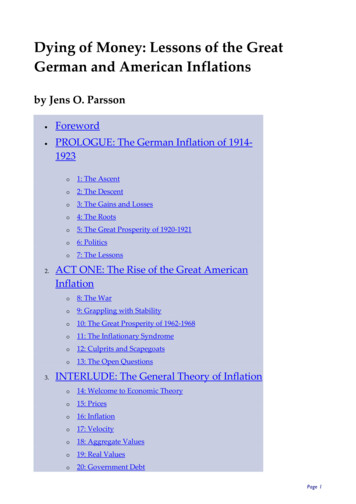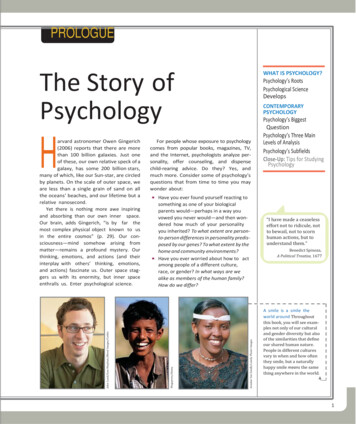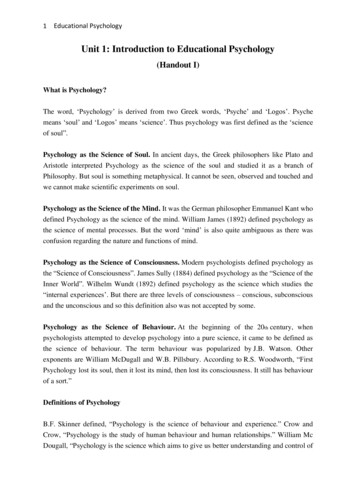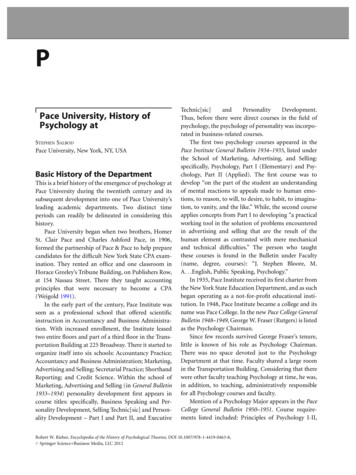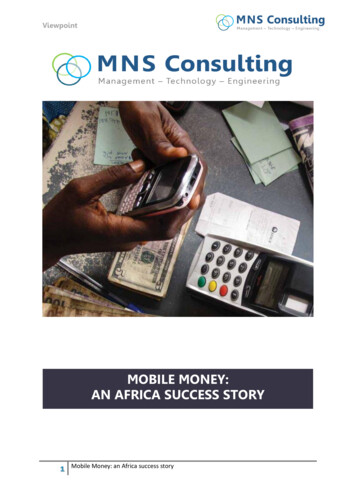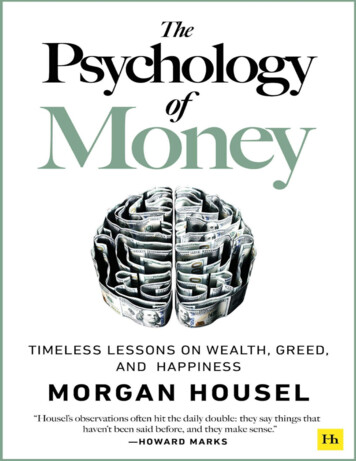
Transcription
ForMy parents, who teach me.Gretchen, who guides me.Miles and Reese, who inspire me.
Introduction: The Greatest Show On Earth1. No One’s Crazy2. Luck & Risk3. Never Enough4. Confounding Compounding5. Getting Wealthy vs. Staying Wealthy6. Tails, You Win7. Freedom8. Man in the Car Paradox
9. Wealth is What You Don’t See10. Save Money11. Reasonable Rational12. Surprise!13. Room for Error14. You’ll Change15. Nothing’s Free16. You & Me17. The Seduction of Pessimism18. When You’ll Believe Anything19. All Together Now20. ConfessionsPostscript: A Brief History of Why the U.S. Consumer Thinks the Way They DoEndnotesAcknowledgementsPublishing details
“A genius is the man who can do the average thing wheneveryone else around him is losing his mind.”—Napoleon“The world is full of obvious things which nobody by anychance ever observes.”—Sherlock Holmes
Ispent my college years working as a valet at a nice hotel in Los Angeles.One frequent guest was a technology executive. He was a genius, having designed andpatented a key component in Wi-Fi routers in his 20s. He had started and sold severalcompanies. He was wildly successful.He also had a relationship with money I’d describe as a mix of insecurity and childishstupidity.He carried a stack of hundred dollar bills several inches thick. He showed it to everyonewho wanted to see it and many who didn’t. He bragged openly and loudly about his wealth,often while drunk and always apropos of nothing.One day he handed one of my colleagues several thousand dollars of cash and said, “Go tothe jewelry store down the street and get me a few 1,000 gold coins.”An hour later, gold coins in hand, the tech executive and his buddies gathered around by adock overlooking the Pacific Ocean. They then proceeded to throw the coins into the sea,skipping them like rocks, cackling as they argued whose went furthest. Just for fun.Days later he shattered a lamp in the hotel’s restaurant. A manager told him it was a 500lamp and he’d have to replace it.“You want five hundred dollars?” the executive asked incredulously, while pulling a brick ofcash from his pocket and handing it to the manager. “Here’s five thousand dollars. Now getout of my face. And don’t ever insult me like that again.”You may wonder how long this behavior could last, and the answer was “not long.” I learnedyears later that he went broke.The premise of this book is that doing well with money has a little to do with how smart youare and a lot to do with how you behave. And behavior is hard to teach, even to really smartpeople.
A genius who loses control of their emotions can be a financial disaster. The opposite is alsotrue. Ordinary folks with no financial education can be wealthy if they have a handful ofbehavioral skills that have nothing to do with formal measures of intelligence.My favorite Wikipedia entry begins: “Ronald James Read was an American philanthropist,investor, janitor, and gas station attendant.”Ronald Read was born in rural Vermont. He was the first person in his family to graduatehigh school, made all the more impressive by the fact that he hitchhiked to campus eachday.For those who knew Ronald Read, there wasn’t much else worth mentioning. His life wasabout as low key as they come.Read fixed cars at a gas station for 25 years and swept floors at JCPenney for 17 years. Hebought a two-bedroom house for 12,000 at age 38 and lived there for the rest of his life.He was widowed at age 50 and never remarried. A friend recalled that his main hobby waschopping firewood.Read died in 2014, age 92. Which is when the humble rural janitor made internationalheadlines.2,813,503 Americans died in 2014. Fewer than 4,000 of them had a net worth of over 8million when they passed away. Ronald Read was one of them.In his will the former janitor left 2 million to his stepkids and more than 6 million to hislocal hospital and library.Those who knew Read were baffled. Where did he get all that money?It turned out there was no secret. There was no lottery win and no inheritance. Read savedwhat little he could and invested it in blue chip stocks. Then he waited, for decades on end,as tiny savings compounded into more than 8 million.That’s it. From janitor to philanthropist.A few months before Ronald Read died, another man named Richard was in the news.Richard Fuscone was everything Ronald Read was not. A Harvard-educated Merrill Lynchexecutive with an MBA, Fuscone had such a successful career in finance that he retired inhis 40s to become a philanthropist. Former Merrill CEO David Komansky praised Fuscone’s“business savvy, leadership skills, sound judgment and personal integrity.”¹ Crain’sbusiness magazine once included him in a “40 under 40” list of successful businesspeople.²But then—like the gold-coin-skipping tech executive—everything fell apart.In the mid-2000s Fuscone borrowed heavily to expand an 18,000-square foot home inGreenwich, Connecticut that had 11 bathrooms, two elevators, two pools, seven garages,and cost more than 90,000 a month to maintain.Then the 2008 financial crisis hit.The crisis hurt virtually everyone’s finances. It apparently turned Fuscone’s into dust. Highdebt and illiquid assets left him bankrupt. “I currently have no income,” he allegedly told a
bankruptcy judge in 2008.First his Palm Beach house was foreclosed.In 2014 it was the Greenwich mansion’s turn.Five months before Ronald Read left his fortune to charity, Richard Fuscone’s home—whereguests recalled the “thrill of dining and dancing atop a see-through covering on the home’sindoor swimming pool”—was sold in a foreclosure auction for 75% less than an insurancecompany figured it was worth.³Ronald Read was patient; Richard Fuscone was greedy. That’s all it took to eclipse themassive education and experience gap between the two.The lesson here is not to be more like Ronald and less like Richard—though that’s not badadvice.The fascinating thing about these stories is how unique they are to finance.In what other industry does someone with no college degree, no training, no background,no formal experience, and no connections massively outperform someone with the besteducation, the best training, and the best connections?I struggle to think of any.It is impossible to think of a story about Ronald Read performing a heart transplant betterthan a Harvard-trained surgeon. Or designing a skyscraper superior to the best-trainedarchitects. There will never be a story of a janitor outperforming the world’s top nuclearengineers.But these stories do happen in investing.The fact that Ronald Read can coexist with Richard Fuscone has two explanations. One,financial outcomes are driven by luck, independent of intelligence and effort. That’s true tosome extent, and this book will discuss it in further detail. Or, two (and I think morecommon), that financial success is not a hard science. It’s a soft skill, where how youbehave is more important than what you know.I call this soft skill the psychology of money. The aim of this book is to use short stories toconvince you that soft skills are more important than the technical side of money. I’ll do thisin a way that will help everyone—from Read to Fuscone and everyone in between—makebetter financial decisions.These soft skills are, I’ve come to realize, greatly underappreciated.Finance is overwhelmingly taught as a math-based field, where you put data into a formulaand the formula tells you what to do, and it’s assumed that you’ll just go do it.This is true in personal finance, where you’re told to have a six-month emergency fund andsave 10% of your salary.It’s true in investing, where we know the exact historical correlations between interest ratesand valuations.And it’s true in corporate finance, where CFOs can measure the precise cost of capital.
It’s not that any of these things are bad or wrong. It’s that knowing what to do tells younothing about what happens in your head when you try to do it.Two topics impact everyone, whether you are interested in them or not: health and money.The health care industry is a triumph of modern science, with rising life expectancy acrossthe world. Scientific discoveries have replaced doctors’ old ideas about how the humanbody works, and virtually everyone is healthier because of it.The money industry—investing, personal finance, business planning—is another story.Finance has scooped up the smartest minds coming from top universities over the last twodecades. Financial Engineering was the most popular major in Princeton’s School ofEngineering a decade ago. Is there any evidence it has made us better investors?I have seen none.Through collective trial and error over the years we learned how to become better farmers,skilled plumbers, and advanced chemists. But has trial and error taught us to becomebetter with our personal finances? Are we less likely to bury ourselves in debt? More likelyto save for a rainy day? Prepare for retirement? Have realistic views about what moneydoes, and doesn’t do, to our happiness?I’ve seen no compelling evidence.Most of the reason why, I believe, is that we think about and are taught about money inways that are too much like physics (with rules and laws) and not enough like psychology(with emotions and nuance).And that, to me, is as fascinating as it is important.Money is everywhere, it affects all of us, and confuses most of us. Everyone thinks about it alittle differently. It offers lessons on things that apply to many areas of life, like risk,confidence, and happiness. Few topics offer a more powerful magnifying glass that helpsexplain why people behave the way they do than money. It is one of the greatest shows onEarth.My own appreciation for the psychology of money is shaped by more than a decade ofwriting on the topic. I began writing about finance in early 2008. It was the dawn of afinancial crisis and the worst recession in 80 years.To write about what was happening, I wanted to figure out what was happening. But thefirst thing I learned after the financial crisis was that no one could accurately explain whathappened, or why it happened, let alone what should be done about it. For every goodexplanation there was an equally convincing rebuttal.Engineers can determine the cause of a bridge collapse because there’s agreement that if acertain amount of force is applied to a certain area, that area will break. Physics isn’tcontroversial. It’s guided by laws. Finance is different. It’s guided by people’s behaviors.And how I behave might make sense to me but look crazy to you.The more I studied and wrote about the financial crisis, the more I realized that you couldunderstand it better through the lenses of psychology and history, not finance.
To grasp why people bury themselves in debt you don’t need to study interest rates; youneed to study the history of greed, insecurity, and optimism. To get why investors sell out atthe bottom of a bear market you don’t need to study the math of expected future returns;you need to think about the agony of looking at your family and wondering if yourinvestments are imperiling their future.I love Voltaire’s observation that “History never repeats itself; man always does.” It appliesso well to how we behave with money.In 2018, I wrote a report outlining 20 of the most important flaws, biases, and causes ofbad behavior I’ve seen affect people when dealing with money. It was called The Psychologyof Money, and over one million people have read it. This book is a deeper dive into thetopic. Some short passages from the report appear unaltered in this book.What you’re holding is 20 chapters, each describing what I consider to be the mostimportant and often counterintuitive features of the psychology of money. The chaptersrevolve around a common theme, but exist on their own and can be read independently.It’s not a long book. You’re welcome. Most readers don’t finish the books they beginbecause most single topics don’t require 300 pages of explanation. I’d rather make 20 shortpoints you finish than one long one you give up on.On we go.
Let me tell you about a problem. It might make you feel betterabout what you do with your money, and less judgmentalabout what other people do with theirs.People do some crazy things with money. But no one is crazy.Here’s the thing: People from different generations, raised bydifferent parents who earned different incomes and helddifferent values, in different parts of the world, born intodifferent economies, experiencing different job markets withdifferent incentives and different degrees of luck, learn verydifferent lessons.Everyone has their own unique experience with how the worldworks. And what you’ve experienced is more compelling thanwhat you learn second-hand. So all of us—you, me, everyone—go through life anchored to a set of views about how moneyworks that vary wildly from person to person. What seemscrazy to you might make sense to me.The person who grew up in poverty thinks about risk andreward in ways the child of a wealthy banker cannot fathom ifhe tried.The person who grew up when inflation was high experiencedsomething the person who grew up with stable prices neverhad to.The stock broker who lost everything during the GreatDepression experienced something the tech worker basking inthe glory of the late 1990s can’t imagine.The Australian who hasn’t seen a recession in 30 years hasexperienced something no American ever has.On and on. The list of experiences is endless.
You know stuff about money that I don’t, and vice versa. You gothrough life with different beliefs, goals, and forecasts, than Ido. That’s not because one of us is smarter than the other, orhas better information. It’s because we’ve had different livesshaped by different and equally persuasive experiences.Your personal experiences with money make up maybe0.00000001% of what’s happened in the world, but maybe80% of how you think the world works. So equally smartpeople can disagree about how and why recessions happen,how you should invest your money, what you should prioritize,how much risk you should take, and so on.In his book on 1930s America, Frederick Lewis Allen wrote thatthe Great Depression “marked millions of Americans—inwardly—for the rest of their lives.” But there was a range ofexperiences. Twenty-five years later, as he was running forpresident, John F. Kennedy was asked by a reporter what heremembered from the Depression. He remarked:I have no first-hand knowledge of the Depression. My familyhad one of the great fortunes of the world and it was worthmore than ever then. We had bigger houses, more servants, wetraveled more. About the only thing that I saw directly waswhen my father hired some extra gardeners just to give them ajob so they could eat. I really did not learn about theDepression until I read about it at Harvard.This was a major point in the 1960 election. How, peoplethought, could someone with no understanding of the biggesteconomic story of the last generation be put in charge of theeconomy? It was, in many ways, overcome only by JFK’sexperience in World War II. That was the other mostwidespread emotional experience of the previous generation,
and something his primary opponent, Hubert Humphrey, didn’thave.The challenge for us is that no amount of studying or openmindedness can genuinely recreate the power of fear anduncertainty.I can read about what it was like to lose everything during theGreat Depression. But I don’t have the emotional scars of thosewho actually experienced it. And the person who lived throughit can’t fathom why someone like me could come across ascomplacent about things like owning stocks. We see the worldthrough a different lens.Spreadsheets can model the historic frequency of big stockmarket declines. But they can’t model the feeling of cominghome, looking at your kids, and wondering if you’ve made amistake that will impact their lives. Studying history makes youfeel like you understand something. But until you’ve livedthrough it and personally felt its consequences, you may notunderstand it enough to change your behavior.We all think we know how the world works. But we’ve all onlyexperienced a tiny sliver of it.As investor Michael Batnick says, “some lessons have to beexperienced before they can be understood.” We are allvictims, in different ways, to that truth.In 2006 economists Ulrike Malmendier and Stefan Nagel fromthe National Bureau of Economic Research dug through 50years of the Survey of Consumer Finances—a detailed look atwhat Americans do with their money.⁴In theory people should make investment decisions based ontheir goals and the characteristics of the investment options
available to them at the time.But that’s not what people do.The economists found that people’s lifetime investmentdecisions are heavily anchored to the experiences thoseinvestors had in their own generation—especially experiencesearly in their adult life.If you grew up when inflation was high, you invested less ofyour money in bonds later in life compared to those who grewup when inflation was low. If you happened to grow up whenthe stock market was strong, you invested more of your moneyin stocks later in life compared to those who grew up whenstocks were weak.The economists wrote: “Our findings suggest that individualinvestors’ willingness to bear risk depends on personal history.”Not intelligence, or education, or sophistication. Just the dumbluck of when and where you were born.The Financial Times interviewed Bill Gross, the famed bondmanager, in 2019. “Gross admits that he would probably notbe where he is today if he had been born a decade earlier orlater,” the piece said. Gross’s career coincided almost perfectlywith a generational collapse in interest rates that gave bondprices a tailwind. That kind of thing doesn’t just affect theopportunities you come across; it affects what you think aboutthose opportunities when they’re presented to you. To Gross,bonds were wealth-generating machines. To his father’sgeneration, who grew up with and endured higher inflation,they might be seen as wealth incinerators.The differences in how people have experienced money are notsmall, even among those you might think are pretty similar.
Take stocks. If you were born in 1970, the S&P 500 increasedalmost 10-fold, adjusted for inflation, during your teens and20s. That’s an amazing return. If you were born in 1950, themarket went literally nowhere in your teens and 20s adjustedfor inflation. Two groups of people, separated by chance oftheir birth year, go through life with a completely differentview on how the stock market works:Or inflation. If you were born in 1960s America, inflation duringyour teens and 20s—your young, impressionable years whenyou’re developing a base of knowledge about how theeconomy works—sent prices up more than threefold. That’s alot. You remember gas lines and getting paychecks thatstretched noticeably less far than the ones before them. But if
you were born in 1990, inflation has been so low for your wholelife that it’s probably never crossed your mind.America’s nationwide unemployment in November 2009 wasaround 10%. But the unemployment rate for African Americanmales age 16 to 19 without a high school diploma was 49%.For Caucasian females over age 45 with a college degree, itwas 4%.Local stock markets in Germany and Japan were wiped outduring World War II. Entire regions were bombed out. At theend of the war German farms only produced enough food toprovide the country’s citizens with 1,000 calories a day.Compare that to the U.S., where the stock market more than
doubled from 1941 through the end of 1945, and the economywas the strongest it had been in almost two decades.No one should expect members of these groups to go throughthe rest of their lives thinking the same thing about inflation.Or the stock market. Or unemployment. Or money in general.No one should expect them to respond to financial informationthe same way. No one should assume they are influenced bythe same incentives.No one should expect them to trust the same sources of advice.No one should expect them to agree on what matters, what’sworth it, what’s likely to happen next, and what the best pathforward is.Their view of money was formed in different worlds. And whenthat’s the case, a view about money that one group of peoplethinks is outrageous can make perfect sense to another.A few years ago, The New York Times did a story on the workingconditions of Foxconn, the massive Taiwanese electronicsmanufacturer. The conditions are often atrocious. Readers wererightly upset. But a fascinating response to the story camefrom the nephew of a Chinese worker, who wrote in thecomment section:My aunt worked several years in what Americans call “sweatshops.” It was hard work. Long hours, “small” wage, “poor”working conditions. Do you know what my aunt did before sheworked in one of these factories? She was a prostitute.The idea of working in a “sweat shop” compared to that oldlifestyle is an improvement, in my opinion. I know that my auntwould rather be “exploited” by an evil capitalist boss for a
couple of dollars than have her body be exploited by severalmen for pennies.That is why I am upset by many Americans’ thinking. We donot have the same opportunities as the West. Ourgovernmental infrastructure is different. The country isdifferent. Yes, factory is hard labor. Could it be better? Yes, butonly when you compare such to American jobs.I don’t know what to make of this. Part of me wants to argue,fiercely. Part of me wants to understand. But mostly it’s anexample of how different experiences can lead to vastlydifferent views within topics that one side intuitively thinksshould be black and white.Every decision people make with money is justified by takingthe information they have at the moment and plugging it intotheir unique mental model of how the world works.Those people can be misinformed. They can have incompleteinformation. They can be bad at math. They can be persuadedby rotten marketing. They can have no idea what they’re doing.They can misjudge the consequences of their actions. Oh, canthey ever.But every financial decision a person makes, makes sense tothem in that moment and checks the boxes they need tocheck. They tell themselves a story about what they’re doingand why they’re doing it, and that story has been shaped bytheir own unique experiences.Take a simple example: lottery tickets.Americans spend more on them than movies, video games,music, sporting events, and books combined.And who buys them? Mostly poor people.
The lowest-income households in the U.S. on average spend 412 a year on lotto tickets, four times the amount of those inthe highest income groups. Forty percent of Americans cannotcome up with 400 in an emergency. Which is to say: Thosebuying 400 in lottery tickets are by and large the same peoplewho say they couldn’t come up with 400 in an emergency.They are blowing their safety nets on something with a one-inmillions chance of hitting it big.That seems crazy to me. It probably seems crazy to you, too.But I’m not in the lowest income group. You’re likely not, either.So it’s hard for many of us to intuitively grasp the subconsciousreasoning of low-income lottery ticket buyers.But strain a little, and you can imagine it going something likethis:We live paycheck-to-paycheck and saving seems out of reach.Our prospects for much higher wages seem out of reach. Wecan’t afford nice vacations, new cars, health insurance, orhomes in safe neighborhoods. We can’t put our kids throughcollege without crippling debt. Much of the stuff you peoplewho read finance books either have now, or have a goodchance of getting, we don’t. Buying a lottery ticket is the onlytime in our lives we can hold a tangible dream of getting thegood stuff that you already have and take for granted. We arepaying for a dream, and you may not understand that becauseyou are already living a dream. That’s why we buy more ticketsthan you do.You don’t have to agree with this reasoning. Buying lottotickets when you’re broke is still a bad idea. But I can kind ofunderstand why lotto ticket sales persist.
And that idea—“What you’re doing seems crazy but I kind ofunderstand why you’re doing it.”—uncovers the root of many ofour financial decisions.Few people make financial decisions purely with aspreadsheet. They make them at the dinner table, or in acompany meeting. Places where personal history, your ownunique view of the world, ego, pride, marketing, and oddincentives are scrambled together into a narrative that worksfor you.Another important point that helps explain why moneydecisions are so difficult, and why there is so muchmisbehavior, is to recognize how new this topic is.Money has been around a long time. King Alyattes of Lydia,now part of Turkey, is thought to have created the first officialcurrency in 600 BC. But the modern foundation of moneydecisions—saving and investing—is based around conceptsthat are practically infants.Take retirement. At the end of 2018 there was 27 trillion inU.S. retirement accounts, making it the main driver of thecommon investor’s saving and investing decisions.⁵But the entire concept of being entitled to retirement is, atmost, two generations old.Before World War II most Americans worked until they died.That was the expectation and the reality. The labor forceparticipation rate of men age 65 and over was above 50% untilthe 1940s:
Social Security aimed to change this. But its initial benefitswere nothing close to a proper pension. When Ida May Fullercashed the first Social Security check in 1940, it was for 22.54, or 416 adjusted for inflation. It was not until the1980s that the average Social Security check for retireesexceeded 1,000 a month adjusted for inflation. More than aquarter of Americans over age 65 were classified by the CensusBureau as living in poverty until the late 1960s.There is a widespread belief along the lines of, “everyone usedto have a private pension.” But this is wildly exaggerated. TheEmployee Benefit Research Institute explains: “Only a quarterof those age 65 or older had pension income in 1975.” Amongthat lucky minority, only 15% of household income came froma pension.
The New York Times wrote in 1955 about the growing desire,but continued inability, to retire: “To rephrase an old saying:everyone talks about retirement, but apparently very few doanything about it.”⁶It was not until the 1980s that the idea that everyone deserves,and should have, a dignified retirement took hold. And the wayto get that dignified retirement ever since has been anexpectation that everyone will save and invest their ownmoney.Let me reiterate how new this idea is: The 401(k)—thebackbone savings vehicle of American retirement—did notexist until 1978. The Roth IRA was not born until 1998. If itwere a person it would be barely old enough to drink.It should surprise no one that many of us are bad at saving andinvesting for retirement. We’re not crazy. We’re all justnewbies.Same goes for college. The share of Americans over age 25with a bachelor’s degree has gone from less than 1 in 20 in1940 to 1 in 4 by 2015.⁷ The average college tuition over thattime rose more than fourfold adjusted for inflation.⁸ Somethingso big and so important hitting society so fast explains why, forexample, so many people have made poor decisions withstudent loans over the last 20 years. There is not decades ofaccumulated experience to even attempt to learn from. We’rewinging it.Same for index funds, which are less than 50 years old. Andhedge funds, which didn’t take off until the last 25 years. Evenwidespread use of consumer debt—mortgages, credit cards,and car loans—did not take off until after World War II, whenthe GI Bill made it easier for millions of Americans to borrow.Dogs were domesticated 10,000 years ago and still retainsome behaviors of their wild ancestors. Yet here we are, with
between 20 and 50 years of experience in the modern financialsystem, hoping to be perfectly acclimated.For a topic that is so influenced by emotion versus fact, this is aproblem. And it helps explain why we don’t always do whatwe’re supposed to with money.We all do crazy stuff with money, because we’re all relativelynew to this game and what looks crazy to you might makesense to me. But no one is crazy—we all make decisions basedon our own unique experiences that seem to make sense to usin a given moment.Now let me tell you a story about how Bill Gates got rich.
Luck and risk are siblings. They are both the reality thatevery outcome in life is guided by forces other thanindividual effort.NYU professor Scott Galloway has a related idea that is soimportant to remember when judging success—both yourown and others’: “Nothing is as good or as bad as it seems.”Bill Gates went to one of the only high schools in the worldthat had a computer.The story of how Lakeside School, just outside Seattle, evengot a computer is remarkable.Bill Dougall was a World War II navy pilot turned high schoolmath and science teacher. “He believed that book studywasn’t enough without real-world experience. He alsorealized that we’d need to know something aboutcomputers when we got to college,” recalled late Microsoftco-founder Paul Allen.In 1968 Dougall petitioned the Lakeside School Mothers’Club to use the proceeds from its annual rummage sale—about 3,000—to lease a Teletype Model 30 computerhooked up to the General Electric mainframe terminal forcomputer time-sharing. “The whole idea of time-sharingonly got invented in 1965,” Gates later said. “Someone waspretty forwardlooking.” Most university graduate schools didnot have a computer anywhere near as advanced as BillGates had access to in eighth grade. And he couldn’t getenough of it.
Gates was 13 years old in 1968 when he met classmate PaulAllen. Allen was also obsessed with the school’s computer,and the two hit it off.Lakeside’s computer wasn’t part of its general curriculum. Itwas an independent study program. Bill
My own appreciation for the psychology of money is shaped by more than a decade of writing on the topic. I began writing about finance in early 2008. It was the dawn of a financial crisis and the worst recession in 80 years. To write about what was hap

